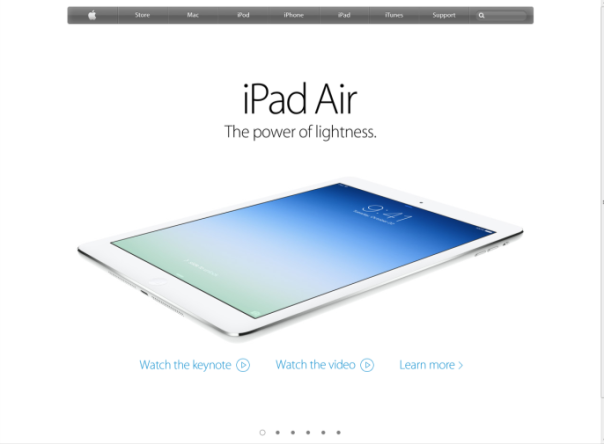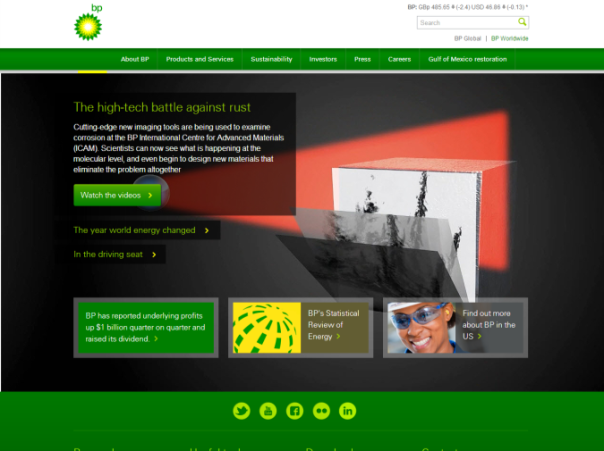This week the discussion focuses on corporate websites. In our digital age, nearly every company and product out there has a website, and if they do not then it almost makes them seem not legit in the minds’ of the consumers.
Bowen Gragg, a London consulting firm, conducted a study of websites and rated them to come up with their annual index of corporate web effectiveness. Over a four month period Bowen Gragg staffers rated sites based on how well companies serve five groups: “investors, the media, job seekers, customers, and society” and then rated those sites based on “the effectiveness of a website’s construction, the clarity of the message conveyed, and how easy it is to contact people inside the company and get questions answered.” This year Bowen Gragg’s index came out on May 22nd and Susan Adams, a Forbes staffer, chimed in on some of the finding in this article.
In the first section Adams discusses Apple and how Apple.com is actually an example of a site that is not effective. (Yes, that’s shocking to hear!) She gives the examples of how Apple has no corporate information on their homepage, no “about” page, and no history about the compelling story of Steve Jobs.
David Bowen, a senior consultant at Bowen Craggs, a London consulting firm, says “[Apple is] not even trying to present themselves as a responsive company or as a company that cares what people think about them” (Adams, 2013). In the social media saturated world that we live, I continue to be surprised that Apple is not engaged on social media. In another Forbes article by Haydn Shaughnessy, he discusses that “what Apple seems to prove is you can be great without dominating social, you can be subject to criticism that you fail to manage adequately, and you can have product failings that seem to leave no dent in your sales.” Brian Solis, a principal analyst at Altimeter Group, a research and advisory company, interjects in a Mashable article that if companies are thinking of mimicking Apple’s lack of social media that they probably should not look to Apple as “the truth is, if [Apple] didn’t have momentum going into this new, connected generation they would have to [join social media]. They already had word of mouth and that word of mouth continues.”
But for those companies that are not Apple… At the top of Bowen Graggs’ list sits BP.com. A page that “became one of the most visited sites in the world on Gulf spill news.” BP has continued to build on the openness they showed during the Deepwater Horizon oil spill with “clear message, accessible contacts, and straightforward construction that makes the site easy to navigate.”
In a separate article on Entrepreneur.com, Michael Lowe, a co-partner in the first distillery in DC since Prohibition commented about their company’s website design by Design Army. He says, “Design is no longer just cosmetic or ‘make something pretty.’ Good designers think strategically, ask the right questions, and help their clients’ businesses grow.” Design Army chimed in as well and said, “Don’t just think of a website as a website; think of it as your storefront. If it looks cheap, you will appear cheap. If it looks expensive, then you can sell your product at a higher price point.”
What a successful site boils down to is “usability and the utility” since “the visitor of the page is the only person who clicks the mouse and therefore decides everything, user-centric design has become a standard approach for success and profit-oriented web design. After all, if users can use a feature, it might as well not exist.” According to Vitaly Friedman, editor-in-chief of Smashing Magazine, her 10 tips for effective website design follow:
1) Don’t make users think.
2) Don’t squander users’ patience.
3) Manage to focus users’ attention.
4) Strive for feature exposure.
5) Make use of effective writing.
6) Strive for simplicity.
7) Don’t be afraid of the white space.
8) Communicate effectively with a “visible language.”
9) Conventions help you gain users’ confidence, trust, reliability, and prove your credibility.
10) Test early, test often.
Bottom line: If you want an effective corporate website, it needs to be easy to digest, easy to navigate, and clearly represent what the company stands for or sells within the first few seconds of seeing the site.
Are there corporate websites that you find effective?

